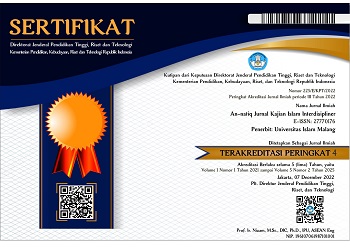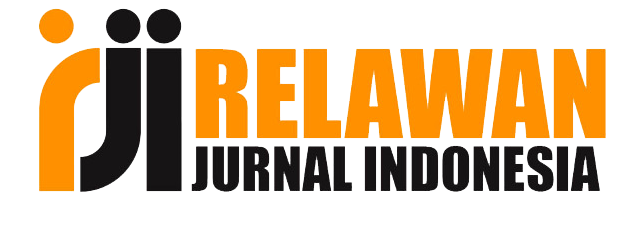PENDEKATAN FILSAFAT DALAM KAJIAN ISLAM: TEORI DAN PRAKTIK
DOI:
https://doi.org/10.33474/an-natiq.v2i1.15503Keywords:
Islamic studies, Philosophical approaches, Islamic philosophy.Abstract
In historical records, philosophical principles and Islamic concepts do not always compatible. The characteristics of philosophy which always question the truth of everything and Islamic principles that hold fast to the truth of revelation as the ultimate truth often lead to conflict. Along with the development of science, Muslim scientists found that philosophy as a scientific methodology can coexist with religious knowledge without contradicting the truth values that have been established in Islam. This study aims to examine more deeply the concept of Philosophy theoretically as a scientific approach as well as the implementation steps in Islamic studies. This study uses qualitative descriptive method with the type of library research. The data analysis technique consists of several steps: 1) data reduction, 2) data presentation, and 3) drawing conclusions. The results show that the philosophical approach in Islamic studies can be implemented using several techniques, including through relativism, realism, contextualism, and historical perspectives, within the scope of ontology, epistemology, or axiology. Examples of the implementation of philosophical-based Islamic studies that have been carried out include conceptual studies of Islamic education in the socio-cultural perspective, comparative studies of Islamic and Western perspective education, and applicative studies of the reconstruction of learning epistemology.
References
Achols, J. M. H. S. (1984). Kamus Bahasa Inggris. British Journal of Psychiatry, 205(01).
Andriyani, I. N. (2016). Pendekatan Dalam Studi Islam (Richard C. Martin). Jurnal Komunikasi Dan Pendidikan Islam, 6(2), 77–88.
Bahrum. (2013). Ontologi, Epistemologi Dan Aksiologi. Sulesana, 8(2), 35–45.
Bakir, M., & Yaakub, H. (2009). A field observation on the philosophy of teaching Islamic and Arabic studies. US-China Education, 6(3), 40–49.
Chariri, A. (2016). Landasan Filsafat Dan Metode Penelitian Kualitatif. Paper Disajikan Pada Workshop Metodologi Penelitian Kuantitatif Dan Kualitatif, 1–27. https://www.researchgate.net/publication/279645679
Fachruddin, S. (2016). Pengantar Filsafat Ilmu (Issue January). Penerbit IPB Press.
Haryono, H. F. (2019). Makalah pengantar dasar filsafat. Makalah Fakultas Adab IAIN Sunan Ampel Surabaya, September. https://doi.org/10.13140/RG.2.2.11631.18087
Hasani. (2012). Filsafat Ilmu dalam Pendekatan Studi Agama : Kajian Konsep dan Aplikasi Ilmu Tafsir dan Syariah. Al-’adalah, 10(3), 353–372.
Hassan, A., Suhid, A., Abiddin, N. Z., Ismail, H., & Hussin, H. (2015). The role of Islamic philosophy of education in aspiring holistic learning. Procedia Social and Behavioral Sciences, 5(2), 2113–2118. https://doi.org/10.1016/j.sbspro.2010.07.423
Jackson, E. (2013). Choosing a Methodology: Philosophical Underpinning. Practitioner Research In Higher Education Journal, 7(1), 49–62.
KBBI. (2020). Kamus Besar Bahasa Indonesia (KBBI) Kamus versi online/daring. Kemendikbud.
Kertanegara, M. (2000). Mozaik Khazanah Islam, Bunga Rampai Dari Chicago. Paramadina.
Kertanegara, M. (2005). Integrasi Ilmu: Sebuah Rekonstruksi Holistik. Paramadina.
Lubis, N. A. F. (2015). Pengantar filsafat umum. PERDANA PUBLISHING.
Miftah, M. (2016). Multicultural Education in The Diversity of National Cultures. QIJIS: Qudus International Journal of Islamic Studies, 4(2), 167–185.
Miles, M. B., & Huberman, A. M. (1994). Qualitative Data Analysis (2nd ed.). Sage Publications.
Mubin, F. (2020). Filsafat Modern: Aspek Ontologis, Epistemologis, Dan Aksiologis. OSF Preprints, 3(1), 99–112. https://doi.org/10.31219/osf.io/x6hgq
Mufid, F. (2014). Islamic sciences integration. QIJIS: Qudus International Journal of Islamic Studies, 2(2), 144–160.
Munawwir, A. W. (1997). Kamus AL-Munawwir Arab-Indonesia. Pustaka Progessif.
Murthadlo, G. (2017). Urgensi Mempelajari Islam Secara Inter-Multidisipliner. Tarbawiyah: Jurnal Ilmiah Pendidikan, 01(2), 220–236.
Nur, M. (2015). Pendekatan Filosofis Dalam Studi Islam. Jurnal Didaktika Islamika, 5(1), 16–46.
Pransiska, T. (2017). Meneropong Wajah Studi Islam dalam Kacamata Filsafat : Sebuah Pendekatan Alternatif. Intizar, 23(1), 165–182.
Rahman, R. A., & Kumalasari, I. (2020). Rekonstruksi Epistemologis Pendidikan Bahasa Arab di Era Disruptif. ARMALA: Jurnal Pendidikan Dan Sastra Bahasa Arab, 1(1), 24–40.
Samsudin, M. (2015). Pendidikan Anak Perspektif Islam Dan Barat ( Studi Analisis Pendekatan Filosofis dan Ilmu Pendidikan ). Jurnal Pendidikan Universitas Garut, 9(1), 33–58.
Santoso, A. (2000). Kamus Lengka Bahasa Indonesia. Kamus Lengka Bahasa Indonesia.
Saunders, M. N. (2016). Understanding research philosophies and approaches (Issue October, pp. 122–162). Pearson Education.
Sulaiman, A. (2016). Mengenal Filsafat Islam (I. F. Sulaiman (ed.); 1st ed.). Fadillah Press.
Suparlan. (2019). Metode dan pendekatan dalam kajian islam. FONDATIA : Jurnal Pendidikan Dasar, 3(1), 83–91.
Syah, M. N. S. (2016). Challenges Of Islamic Education In Muslimworld : Historical , Political , And Socio-Cultural Perspective. QIJIS: Qudus International Journal of Islamic Studies, 4(1), 82–105.
Turmudzi, M., & Tsuroya, F. I. (2020). Pendidikan Islam Ramah Budaya: Pendekatan Filosofis. Journal of Islamic Education Research, 1(02), 15–27.
Untung, M. S. (2019). Metodologi Penelitian: Teori dan Praktik Riset Pendidikan dan Sosial (p. 39). Litera.
Wattimena, R. A. A. (2018). Metodologi Penelitian Filsafat (Editor: Reza A.A Wattimena) (Issue January 2010). Penerbit Kanisius.


























